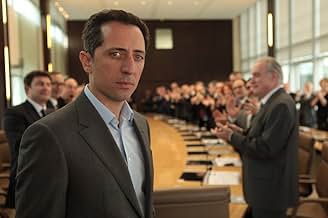IMDb RATING
6.5/10
5.6K
YOUR RATING
The newly appointed CEO of a giant European investment bank works to hold on to his power when an American hedge fund company tries to buy out his company.The newly appointed CEO of a giant European investment bank works to hold on to his power when an American hedge fund company tries to buy out his company.The newly appointed CEO of a giant European investment bank works to hold on to his power when an American hedge fund company tries to buy out his company.
- Awards
- 1 win & 2 nominations
Storyline
Did you know
- GoofsIn a dinner scene towards 67 minutes into the film, the liquid level in a bottle in front of Marc Tourneuil keep on changing between shots.
- Quotes
L'oncle Bruno: Your bank makes money and you lay people off. How do you cope?
Featured review
If there is one message that the movie is trying to communicate to its audience it's the above title.
There are of course reviews that point out the alleged likeliness of this film with movies like "Wall Street" usually concluding "that there is nothing new to see". Under closer examination however, any similarities between the two films go only skin-deep and can only be considered superficial. There are fundamental differences between these two movies because they represent two different approaches and evaluations of the same issue and which one hits home is up for you to decide. And thats because "Wall Street" focuses on the seducing power and aloofness of a loan shark that acts as a money fueled lone wolf, as opposed to the naiveness of a young rookie which is slow to disillusion himself about his own actions while he's getting carried away (but eventually comes out on top etc). The caveat of such scenarios is in that they constantly, silently and almost purposefully marginalize the inherent, all consuming, self-perpetuating environment and ill-conceived culture that money in and all by itself creates, even for "the winners of the game".
La Capital on the other hand has none of the above shortcomings when it comes to describing the black hole lurking deep into the very foundations of our culture: Money. It's a film about attitudes and value systems across the board, with a scenario that's free of cliché good-guy-vs-bad-guy dualities and with the courageous nerve to "pull no punches" sparing its viewer from having to suffer another stereotypical "happy ending" made-in-Hollywood (has elements of it but still its not "right into your face").
Finally, I would just like to add that, all in all, Mr Gavras is right in that there will come a time in the not so distant future ... A time in which, among other things, our western culture will look back to the contemporary intellectuals and artists to examine which ones did of their duty in terms of articulating the public opinion, bringing the spotlight on the machinations of the financial system and the corrosive effects that money in and all by itself has both on our societies as a whole, in our own micro-worlds and those of our acquaintances as well as our own fragile, individual psyches. And when this time comes I think that the memory of both Mr Gavras and those that stood by him in this and similar projects will be, if not exalted, then at the very least spared from the outrage of the dystopian poverty-striken masses.
There are of course reviews that point out the alleged likeliness of this film with movies like "Wall Street" usually concluding "that there is nothing new to see". Under closer examination however, any similarities between the two films go only skin-deep and can only be considered superficial. There are fundamental differences between these two movies because they represent two different approaches and evaluations of the same issue and which one hits home is up for you to decide. And thats because "Wall Street" focuses on the seducing power and aloofness of a loan shark that acts as a money fueled lone wolf, as opposed to the naiveness of a young rookie which is slow to disillusion himself about his own actions while he's getting carried away (but eventually comes out on top etc). The caveat of such scenarios is in that they constantly, silently and almost purposefully marginalize the inherent, all consuming, self-perpetuating environment and ill-conceived culture that money in and all by itself creates, even for "the winners of the game".
La Capital on the other hand has none of the above shortcomings when it comes to describing the black hole lurking deep into the very foundations of our culture: Money. It's a film about attitudes and value systems across the board, with a scenario that's free of cliché good-guy-vs-bad-guy dualities and with the courageous nerve to "pull no punches" sparing its viewer from having to suffer another stereotypical "happy ending" made-in-Hollywood (has elements of it but still its not "right into your face").
Finally, I would just like to add that, all in all, Mr Gavras is right in that there will come a time in the not so distant future ... A time in which, among other things, our western culture will look back to the contemporary intellectuals and artists to examine which ones did of their duty in terms of articulating the public opinion, bringing the spotlight on the machinations of the financial system and the corrosive effects that money in and all by itself has both on our societies as a whole, in our own micro-worlds and those of our acquaintances as well as our own fragile, individual psyches. And when this time comes I think that the memory of both Mr Gavras and those that stood by him in this and similar projects will be, if not exalted, then at the very least spared from the outrage of the dystopian poverty-striken masses.
- xdisruptor
- Sep 21, 2013
- Permalink
- How long is Capital?Powered by Alexa
Details
Box office
- Gross US & Canada
- $101,700
- Opening weekend US & Canada
- $22,400
- Oct 27, 2013
- Gross worldwide
- $4,822,849
- Runtime1 hour 54 minutes
- Color
- Sound mix
- Aspect ratio
- 2.35 : 1
Contribute to this page
Suggest an edit or add missing content




































